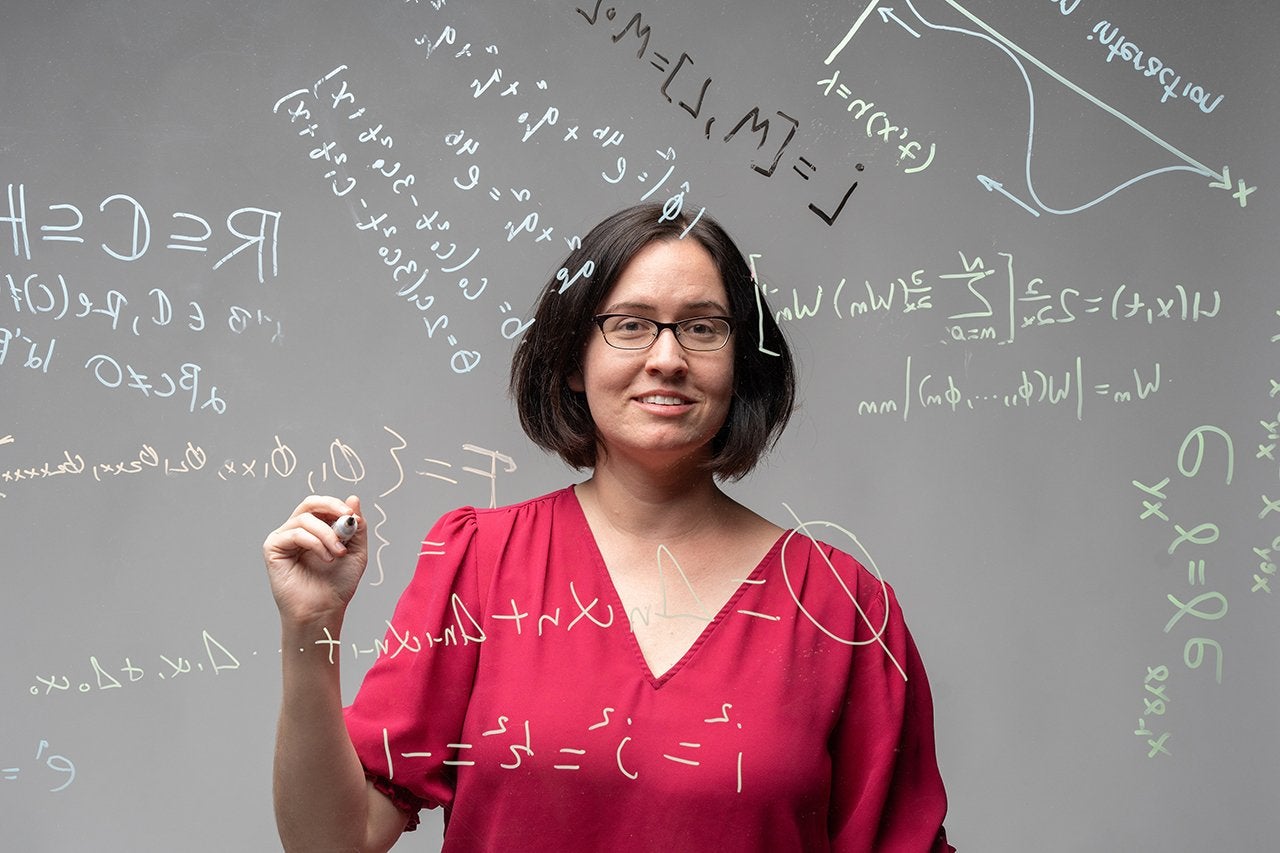The College has been around for more than 250 years, but it’s never had a Ph.D. student.
Until now.
Lauren Tubbs ’14, ’19 (M.S. ’16) is the person making history in the new Mathematics with Computation doctoral program – just another sign that the College has become a comprehensive university.
“There are many reasons that the admissions committee selected Lauren as the first student, but Lauren’s passion for the subject of mathematics was certainly one factor,” says Alex Kasman, Mathematical Sciences Graduate Program co-director, adding that the entire math department is already benefiting from it. Tubbs has started a weekly seminar on elliptic curves, which lie at the intersection of geometry and her research interests in number theory.
Truth be told, Tubbs wasn’t very good at math in high school while growing up in Mount Pleasant, South Carolina. It wasn’t until she took Calculus I at Trident Technical College that everything clicked.
“I had two revelations: one, that calculus seemed to solve every problem I could ever think of, and two, that doing tons of problems and feeling your technical skill grow was an awful lot of fun,” she says. “The teacher, David Harris, was energetic, funny and seemed to revel in doing hard problems. I had so much fun in his class, and I remember being amazed the whole time that I could do it.”
Tubbs transferred to the College her junior year and became an adjunct instructor at CofC after getting her master’s. She also earned a computer science degree during that time and then worked as a programmer in Charlotte.
But she missed math, so she got a job at Hawkes Learning editing math textbooks in Mount Pleasant. She gave birth to a daughter in 2021 before returning to CofC last spring as an adjunct and applying to become the College’s first Ph.D. student.
“My working time is really limited, so I often end up getting up at 4:30 a.m. to study and doing homework at night after my daughter goes to bed,” she says. “It’s incredibly hard and often feels impossible. But I also am routinely amazed that I’m currently satisfying two amazing dreams at once – I have a family, and I’m getting a Ph.D. I have wanted both of those things for a long time.”
The College Today caught up with Tubbs to find out more about her love of mathematics and about the program, her experience within it and what she hopes to take away from it. Here’s what she had to say.
Why did you decide to return to the College of Charleston to get your Ph.D.?
Having attended the College of Charleston for my undergraduate and master’s degrees, I have always been grateful for the immense generosity and friendliness of the faculty, as well as the small class sizes, ability to do reading courses in specialized topics and the amount of attention which individual students receive. On top of these student-friendly traits, the department is full of active researchers in a variety of fields. It’s an incredible honor to be the first Ph.D. student here.
What excites you most about the Ph.D. program?
The fact that I will have opportunities to do research, give talks, attend conferences and workshops, and meet other people who are fascinated by the same things I am. If your hobby is playing a sport or a musical instrument, you can easily find a way to do that with other people. But if your hobby is doing math, it’s a bit harder to find social outlets. Being at a university again and being surrounded by people who also love math has been a fantastic privilege.
How long will it take?
I am a full-time student and hope to graduate after three years in the program. I’ll be taking standard coursework and electives for the first two years, and the third year I will (hopefully!) be finishing my dissertation.
Why number theory?
I took a number theory course with [mathematics professor] Dr. Paul Young when I was an undergraduate at CofC. I had already been primed to love number theory by reading a lot of math history, but the course with Dr. Young sealed the deal. His enthusiastic and crystal-clear lectures laid bare the beauty of the subject.
Number theory is the study of the natural numbers – 1, 2, 3, 4, etc. It asks questions like, “Which primes can be expressed as the sum of two squares?” or “Can you add two perfect cubes and get another perfect cube?” I love that it involves these very simple problems that often have a long classical history, and yet, to solve them, an immense amount of algebra, analysis and geometry had to be developed and combined over centuries. In many cases, the mathematics is still being developed to answer classical questions. I adore the way history intertwines with number theory, the way the subject combines concrete problem statements and nitty-gritty calculations with very abstract techniques, and the way the techniques come from just about every area of math you can think of.
What do you love about math?
The fact that it is creative, highly ordered and intensely beautiful. When I was younger, I wanted to be a writer or a filmmaker, but math feels expressive in a more satisfying way because it’s subject to absolute external laws. It’s far more beautiful than anything a human could create.
What are your post-graduation plans?
I would love to teach at the college level or get a job doing math in industry. I also hope that I can continue doing number theory and stay connected to the academic community.




